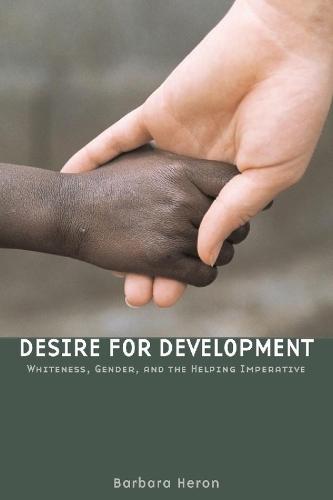Overview
In Desire for Development: Whiteness, Gender, and the Helping Imperative, Barbara Heron draws on poststructuralist notions of subjectivity, critical race and space theory, feminism, colonial and postcolonial studies, and travel writing to trace colonial continuities in the post-development recollections of white Canadian women who have worked in Africa. Following the narrative arc of the development worker story from the decision to go overseas, through the experiences abroad, the return home, and final reflections, the book interweaves theory with the words of the participants to bring theory to life and to generate new understandings of whiteness and development work. Heron reveals how the desire for development is about the making of self in terms that are highly raced, classed, and gendered, and she exposes the moral core of this self and its seemingly paradoxical necessity to the Other. The construction of white female subjectivity is thereby revealed as contingent on notions of goodness and Othering, played out against, and constituted by, the backdrop of the NorthSouth binary, in which Canada's national narrative situates us as the """"good guys"""" of the world.
Full Product Details
Author: Barbara Heron
Publisher: Wilfrid Laurier University Press
Imprint: Wilfrid Laurier University Press
Dimensions:
Width: 15.20cm
, Height: 1.20cm
, Length: 22.90cm
Weight: 0.310kg
ISBN: 9781554580019
ISBN 10: 1554580013
Pages: 204
Publication Date: 30 December 2007
Audience:
Professional and scholarly
,
Professional & Vocational
Format: Paperback
Publisher's Status: Active
Availability: Awaiting stock

The supplier is currently out of stock of this item. It will be ordered for you and placed on backorder. Once it does come back in stock, we will ship it out for you.
Reviews
Who has not thought about going to the Third World to help? Heron pushes our buttons when she argues that helping can be the oldest colonial move. Perceptive, stunning in its honesty, yet unwilling to dismiss helping altogether, this book helps us to thread our way through the moral complexities of the First World position of colonizers who now set out to improve the very societies they continue to exploit. This resolutely anti-colonial study of whiteness and gender is crucial for thinking critically about development. --Sherene Razack, author of Dark Threats and White Knights: The Somalia Affair, Peacekeeping, and the New Imperialism (2004)
Who has not thought about going to the Third World to help? Heron pushes our buttons when she argues that helping can be the oldest colonial move. Perceptive, stunning in its honesty, yet unwilling to dismiss helping altogether, this book helps us to thread our way through the moral complexities of the First World position of colonizers who now set out to improve the very societies they continue to exploit. This resolutely anti-colonial study of whiteness and gender is crucial for thinking critically about development. - Sherene Razack, author of Dark Threats and White Knights: The Somalia Affair, Peacekeeping, and the New Imperialism (2004)
Author Information
A former development worker in Zambia (1981-1992), Barbara Heron is an associate professor in the School of Social Work, York University. Her research focuses on whiteness and the helping imperative and how these issues play out in the development context. Barbara Heron has published in the Journal of Gender Studies, International Social Work, and Critical Social Work.




